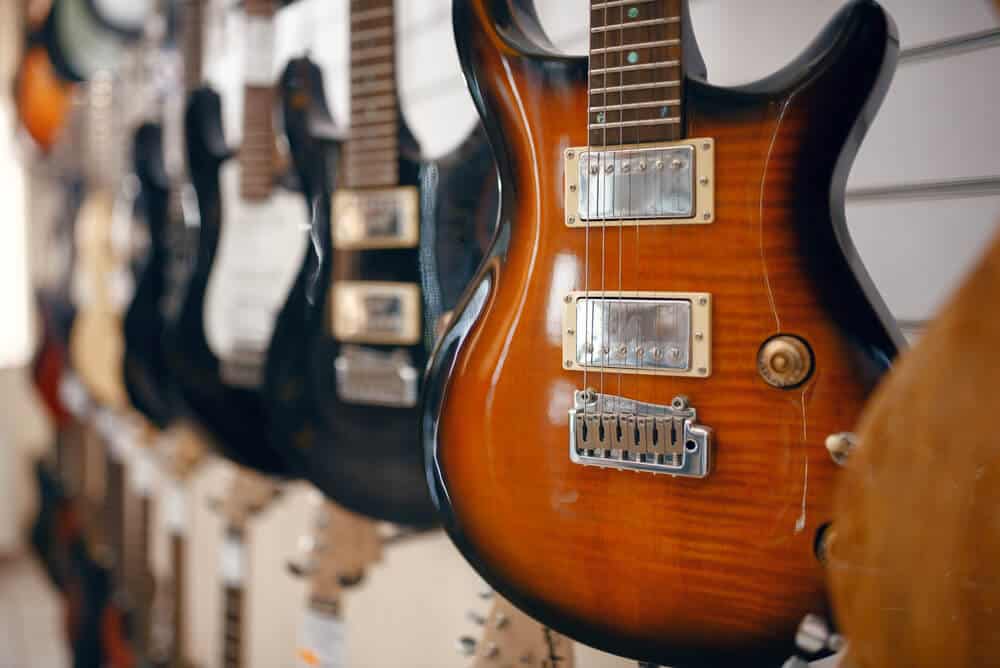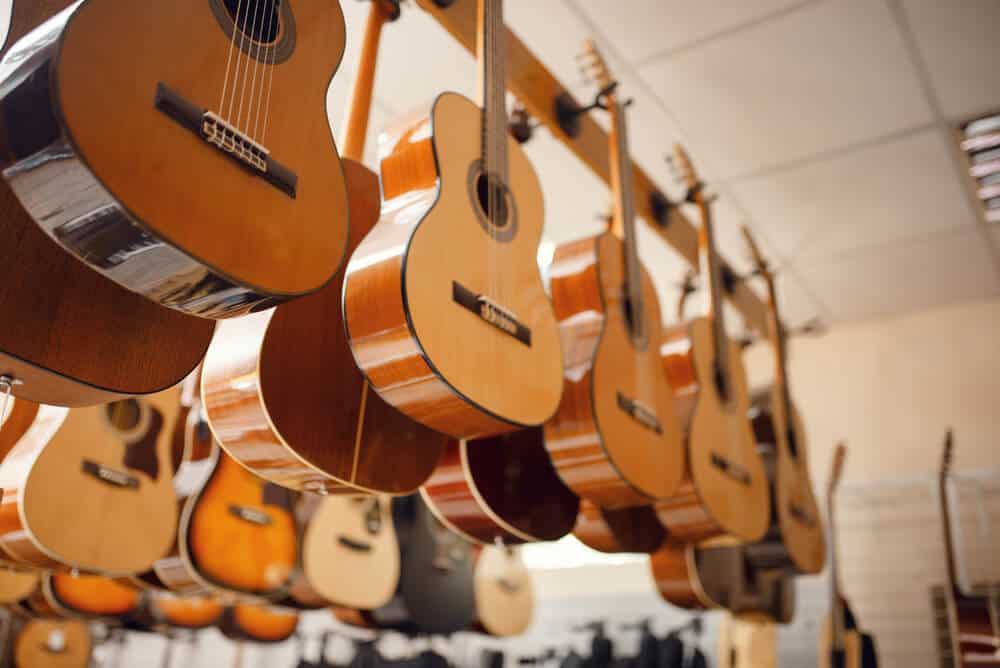Guitars come in all shapes and sizes to suit the playing preferences of a variety of musicians. But is it just about looks, or does guitar shape have other effects as well?
Aside from looking cool, a guitar’s shape can impact tone, playability, comfort, ease of access to the whole fretboard and overall feel. All of these factors are personal to each musician and how he or she plays, so guitar shape is an important factor to consider when choosing an instrument.
Let’s take a closer look at each of these factors below.
Does Electric Guitar Shape Matter?

Electric guitars are offered in a wider range of shapes, sizes and body styles than acoustic guitars. Hollow body guitars, single cutaways, double cutaways, flying v shapes…think about some of your favorite guitarists, and chances are they all use a very different guitar shape.
While the way a guitar looks certainly plays a role in why a guitarist may choose one over another design, there are some other significant ways a guitar’s shape matters.
3 Impacts of Electric Guitar Shape
1. Tone
Electric guitars come in three main designs: solid, semi-hollow, or hollow body.
Hollow or semi-hollow body guitars are built with cutouts and open spaces in the body. This improves resonance and creates a specific tone, but requires a larger surface area. Due to this, hollow and semi-hollow body guitars are slightly more limited in the shapes and sizes that can be offered.
Hollow and semi-hollow body guitars wishing to produce a louder, more bassy tone must be larger to accommodate more internal surface area for the notes to resonate. Smaller guitars with less internal surface area will have a brighter, less resonant tone.
You’ll typically see solid body guitars in a wider range of shapes and sizes: since they don’t rely on cutouts to provide tone, they can be designed in more unique ways.
2. Feel / Playability
The way a guitar feels is very personal to each individual. That’s why there are so many different shapes and sizes offered.
The way a guitar body is cut will impact how heavy it is. An extra pound may not be much, but the longer the guitar is hanging around your neck, the heavier it will start to feel.
Also affected will be how comfortable it is to play. Before choosing a guitar, be sure to try playing it both standing and sitting. A guitar may feel fine when you’re standing up, but since most of us probably do a lot of practicing sitting down, this is something to consider as well. A flying v guitar may look cool, but it doesn’t like to stay in place when you’re sitting down!
3. Fret Access
The shape of the guitar body can affect how easy it is to reach all the frets.
Single cutaway guitars (like the Les Paul design) are very popular, but they can make it a bit more difficult to reach the higher frets. A double cutaway guitar (like a Stratocaster or SG design) makes it easier to access the higher frets, as your whole hand can slide higher up the fretboard.
The shape of a guitar’s neck also impacts fret access.
A guitar with a narrow C-shaped neck profile will be easier for players to wrap their hands around and fret notes more firmly compared to a neck with a wider U-shaped profile. This is especially true for players with smaller hands. However, players with larger hands may find a wider neck makes fretting notes feel more natural.
How Body Shape Affects Electric Guitar Sound
The effect a guitar’s shape has on its sound will be more pronounced in hollow and semi-hollow body guitars than in solid body guitars, since the two former designs rely on cutouts and increased surface area inside the body to produce a specific tone.
In general, larger hollow and semi-hollow body guitars will produce a deeper, more resonant tone, while smaller models will produce a brighter but less robust tone. One isn’t better than the other; they’re designed with specific music genres and playing styles in mind.
Solid body guitar sound isn’t really affected by body size and shape. These instruments rely completely on internal electronic components to produce their tone. This generally makes them more versatile, as they’re able to play a wide variety of musical genres well. It’s a great choice for a musician who doesn’t want to limit themselves to a certain playing style.
Does Acoustic Guitar Shape Matter?

More so than electric guitars, acoustic guitar shape has a significant impact on how the guitar sounds, feels and plays. Since acoustic guitars rely on their hollow design to produce sound, the guitar’s shape and amount of surface area inside can be tailored to produce a specific tone.
While you won’t see the wide range of unique shapes and designs as compared to electric guitars, changes in acoustic guitar shape don’t have to be as drastic to result in major changes.
3 Impacts of Acoustic Guitar Shape
1. Tone
The way an acoustic guitar sounds will be greatly impacted by its shape.
Larger guitars with more surface area inside will produce a louder, more resonant and bassy tone. Picture the difference in size between a “00” guitar and a “Dreadnought” (check out this link for a visual representation). A dreadnought is much bigger, therefore each note resonates more within the body of the instrument, producing a louder, fuller sound.
Smaller guitars will have less space inside for notes to resonate, and will sound quieter. They will however produce a brighter tone with more treble, which may be preferable depending on the style of music you play.
The thickness of the wood layer that creates the body also affects the guitar’s sound. Guitars made from thinner, lighter wood will have a quieter sound and brighter tone, while guitars made from thicker, heavier wood will have a more robust, booming tone.
2. Feel / Playability
The louder and more robust you want your acoustic guitar to be, the physically larger it will need to be. This comes at the cost of playability and comfort. A giant guitar (like the bass guitar used in a mariachi band) will be harder to wield, especially if you’re on the smaller side. A larger guitar will also be harder and more cumbersome to play while seated.
A smaller guitar may not produce as loud or deep a tone, but it will be much easier to play whether standing or seated. This will be a more ideal choice for smaller musicians as well.
Though different sized guitars produce very different sounds, the size of the guitar that feels best for you will likely be influenced by personal preference as well.
3. Fret Access
There are very few acoustic guitar designs that feature a cutaway to make access to the higher frets easier. Therefore, no matter what type of guitar you choose, reaching the highest frets with your non-picking hand will be nearly impossible. So let’s focus on the rest of the guitar neck.
Similar to electric guitars, acoustic guitar necks with a narrow C-shape will be easier for the majority of musicians to play. They allow a more natural, comfortable hand position when fretting notes, especially for players with smaller hands. Wider, U-shaped necks may be preferred by players with larger hands, as their fingers will sit more naturally on this larger design.
But again, it comes down to your own anatomy and playing preferences. As long as you choose a guitar that you can play comfortably and that fits you best, there is no right or wrong answer here.
How Body Shape Affects Acoustic Guitar Sound
Overall, acoustic guitars with smaller bodies will have less surface area inside to produce sound. Therefore, they will produce a quieter yet brighter tone. Guitars with larger bodies will have more space inside for sound to resonate and will be louder and more bassy.
Aside from choosing a guitar size that fits you best, consider the setting in which you’ll be playing. If you just play for fun or play solo gigs in smaller venues, a smaller guitar may serve you better. If you play in larger venues, accompany a singer, or play in a band or orchestra (where you’re competing with other instruments to be heard) a larger, more resonant guitar may be a better option.